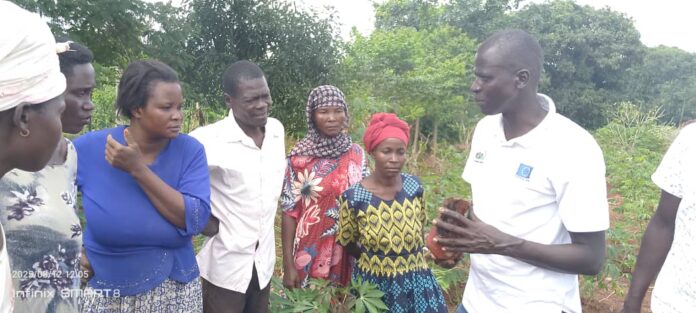By Ali Lukomo
For decades, the fertile plains of Busoga have been synonymous with sugarcane, a crop that has shaped the economic landscape but often left many households struggling with fluctuating incomes and land degradation. However, a quiet yet profound agricultural revolution is now underway, as farmers in districts like Kamuli and Buyende are strategically shifting their focus towards the more sustainable and lucrative cultivation of coffee and bananas.
This significant change is being driven by a compelling desire to bolster household incomes and secure a more stable future for farming communities. Farmers, increasingly informed by media houses and agricultural outreach programs across Busoga, are recognizing the immense potential of coffee as a long-term investment that promises substantial yields and better returns.
Spearheading this transformative initiative is the Ministry of Agriculture, through its dedicated Department of Coffee Development. Recognizing coffee as a heritage cash crop for the region, the Ministry is actively working to re-educate and sensitize communities, guiding them back to their original economic roots.
A key component of this effort is the ambitious distribution of over 45,000 coffee seedlings – high-quality, improved varieties designed for optimal productivity. But the Ministry’s support extends far beyond just providing planting material. Farmers are receiving crucial training in modern methodologies of coffee cultivation, including critical aspects like the application of locally made fertilizers. This holistic approach ensures that farmers are not only planting but also nurturing their crops using sustainable and cost-effective practices.
“Gone are the days when coffee and cotton were the undisputed main cash crops in Busoga,” explains a regional agricultural officer. “For too long, their cultivation dwindled, almost dying a natural death. Now, thanks to dedicated organizations and media houses, we are working tirelessly to bring them back, and the community is slowly but surely embracing this revival, seeing the clear value in it.”
The economic incentives are proving to be a powerful motivator. A kilogram of clean, processed coffee beans currently fetches an impressive UGX 10,000, while unprocessed “kiboko” goes for UGX 4,000 and above. These robust prices offer a stark contrast to the often-depressed returns from sugarcane, making coffee an increasingly attractive option.
Diversification for Resilience and Land Health
Speaking to a group of farmers from the Bugonda Farmers Group, Michael Baguma, the Coffee Regional Agriculture Officer in charge of Kamuli and Buyende, reiterated the Ministry’s commitment. “Our aim is to empower our farmers by giving out free coffee seedlings and call upon them to stick to coffee and cocoa as their main cash crops, alongside bananas.”
Baguma emphasized the strategic importance of diversification, particularly the inclusion of bananas. “Bananas are not only a staple food crop, ensuring household food security, but they also contribute significantly to soil health, helping to keep the land safe and productive,” he stated. This is a subtle yet critical jab at sugarcane monoculture, which is often associated with soil nutrient depletion and environmental strain.
The shift in Busoga is more than just a change in crops; it’s a paradigm shift towards sustainable agriculture, economic empowerment, and a renewed sense of pride in the region’s agricultural heritage. With government support, committed farmers, and the natural advantages of coffee and banana, Busoga is poised to cultivate a future that is not only greener but significantly more prosperous.



